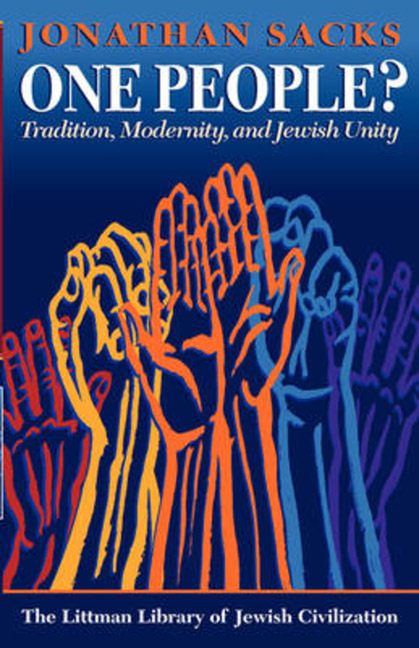Book contents
- Frontmatter
- Dedication
- Preface
- Contents
- Note on Transliteration and Place Names
- Abbreviations
- 1 The Crisis of Contemporary Jewish Thought
- 2 The Birth of the Adjectival Jew
- 3 Orthodoxy, History, and Culture
- 4 Orthodoxy and Jewish Peoplehood
- 5 Tradition and Diversity
- 6 Inclusivism
- 7 A Collision of Consciousness
- 8 Schism?
- 9 The Future of a People
- Bibliography
- Index
5 - Tradition and Diversity
- Frontmatter
- Dedication
- Preface
- Contents
- Note on Transliteration and Place Names
- Abbreviations
- 1 The Crisis of Contemporary Jewish Thought
- 2 The Birth of the Adjectival Jew
- 3 Orthodoxy, History, and Culture
- 4 Orthodoxy and Jewish Peoplehood
- 5 Tradition and Diversity
- 6 Inclusivism
- 7 A Collision of Consciousness
- 8 Schism?
- 9 The Future of a People
- Bibliography
- Index
Summary
THE argument of the preceding chapters can now be summarized. Enlightenment and emancipation set in motion deeply fragmenting forces within the Jewish world, forces whose full disintegrative potential is as yet unexhausted. It set before Jews the question asked with brutal clarity some two hundred years ago by the Count of ClermontTonerre. Are Jews individuals who have in common no more than a private religious belief, or are they a people, a nation? The question, of course, could not be answered, for both were true. Judaism was the religion of a people, and Jews were a people constituted by a religion. Judaism essentially contradicted the terms of the either-or. But the question could not be evaded, not only because it formed the political choice Jews were called on to make in the nineteenth century, but because at a deeper level it is the choice posed to all religions by secularization. As the institutions of the public domain are progressively removed from ecclesiastical power, society itself becomes differentiated into a secular state and an increasingly private religiosity. In which category, therefore, did Jewish identity belong?
Either answer involved a revolution. Secular Zionism predicated Jewish identity on secular nationhood and the state to be formed by the return of Jews to their land. Liberal, Reform, and to a lesser extent Conservative theologians saw Jewish identity as essentially religious, not national. But the accommodations they felt were necessary to ensure Jewish integration within a non-Jewish society led to either a formal break with halakhah or a radical reinterpretation of the halakhic process. Orthodoxy, bound by the covenantal tradition, resisted the terms of the question. Judaism was both religious and national. A nonreligious nationalism and a non-national religion both misrepresented Judaism's historic character. But by the end of the nineteenth century Reform and secular Zionism were powerful forces, and Orthodoxy was bound to part company with both.
But there were profound divisions within Orthodoxy itself. There were movements to hold together what secularization was driving apart: Torah and secular culture,Judaism and Zionism, and the Jewish people. Paradoxically these three movements-torah im derekh eretz, religious Zionism, and communally involved (Gemeinde) Orthodoxy have often been grouped together under the name ‘Modern Orthodoxy'.
- Type
- Chapter
- Information
- One People?Tradition, Modernity, and Jewish Unity, pp. 88 - 115Publisher: Liverpool University PressPrint publication year: 1993



